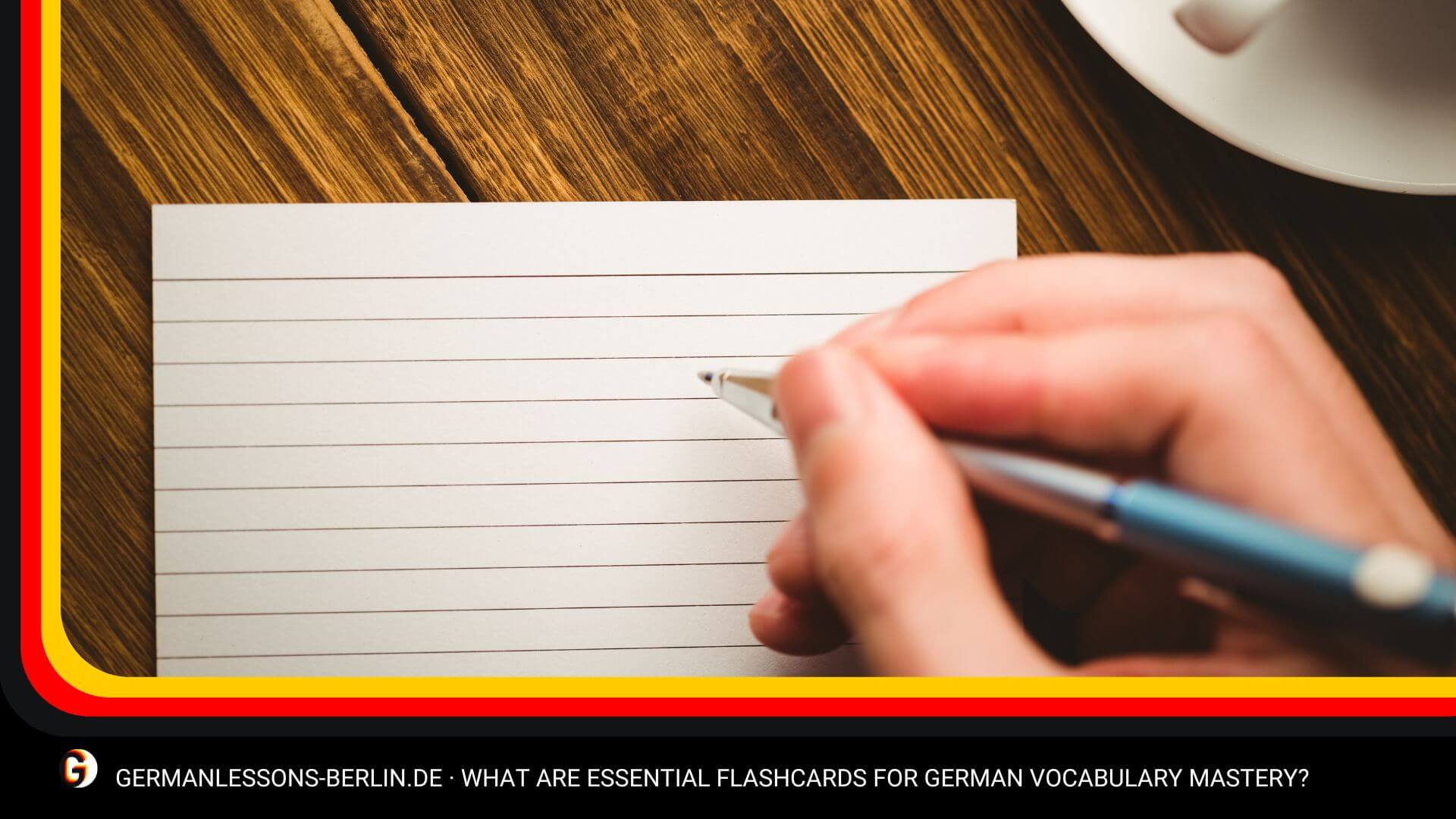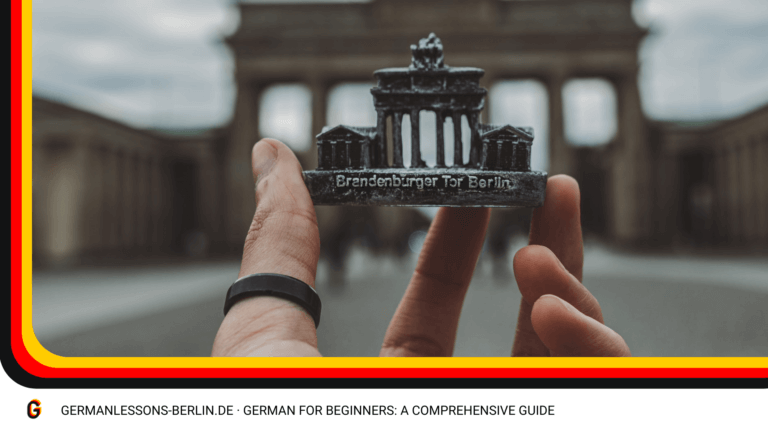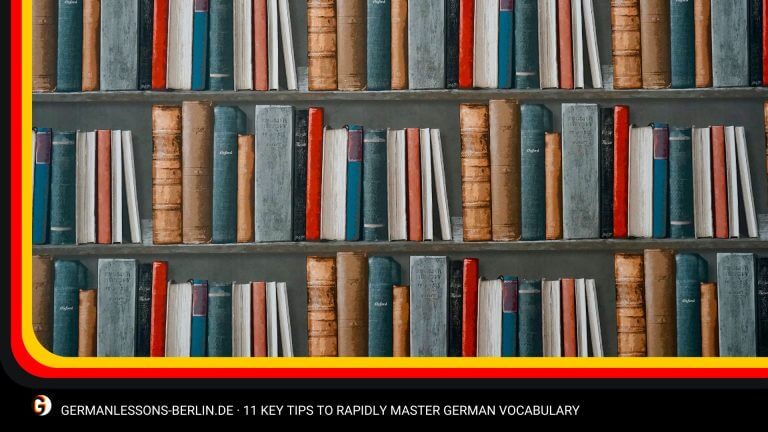I’ve always been fascinated by languages, and German is no exception. Mastering its vocabulary was a challenge until I stumbled upon the magic of flashcards. They’ve become my secret weapon, turning tedious memorization into a fun, effective learning experience. In this article, I’ll share the essential flashcards that have been game-changers for me, helping to unlock the beauty and complexity of the German language. Whether you’re starting out or refining your skills, these insights will be invaluable.
Table of Contents
Key Takeaways
- Pronouns and articles in German change depending on their case and gender, and understanding them is crucial for forming correct sentences.
- Flashcards can help drill the concepts of pronouns and articles into memory.
- Verbs like ‘sein’ (to be) and ‘haben’ (to have) are important in various contexts, while action verbs like ‘gehen’ (to go), ‘kommen’ (to come), ‘sehen’ (to see), and ‘hören’ (to hear) are vital for everyday communication.
- Mastering basic German nouns, such as ‘Der Tisch’ (the table), ‘Die Familie’ (the family), and ‘Das Buch’ (the book), is essential for constructing meaningful dialogue.
Basics of Pronouns and Articles
In my journey to master German, understanding the basics of pronouns and articles has been crucial, as they’re the building blocks of sentence structure. German pronouns change depending on their case—nominative, accusative, dative, or genitive. It’s essential to grasp this to form correct sentences. Similarly, articles in German—’der’, ‘die’, and ‘das’ for definite articles, and ‘ein’, ‘eine’ for indefinite—also change according to the case and gender of the noun they accompany. Memorizing these variations can be challenging, but it’s a game changer for communication. Flashcards have been indispensable tools for drilling these concepts into my memory. As I’ve conquered pronouns and articles, I’ve turned my attention to key everyday verbs, which are just as vital for everyday interactions.
Key Everyday Verbs
Having tackled the intricacies of pronouns and articles, how can I now ignore the significance of key everyday verbs in mastering German vocabulary? Verbs are the backbone of language, and in German, they’re no exception. I make sure my flashcards include verbs like “sein” (to be) and “haben” (to have), as they’re ubiquitous across various contexts. I also focus on action verbs such as “gehen” (to go), “kommen” (to come), “sehen” (to see), and “hören” (to hear), which are vital in everyday communication.
Incorporating these verbs into my study sessions, I practice conjugations and build sentences, gradually enhancing my fluency. It’s essential for me to not just memorize these verbs, but to actively use them in conversation to truly internalize their meanings and nuances.
Essential Nouns for Beginners
I transition from verbs to nouns, recognizing that mastering basic German nouns is crucial for constructing meaningful dialogue. As I delve into the world of nouns, I’ve found that having a solid foundation in everyday vocabulary can make a significant difference in communication. Here are a few essential nouns that every beginner should know:
- Der Tisch (the table): A common piece of furniture, it’s a word frequently used at home or in restaurants.
- Die Familie (the family): Central to personal discussions, it connects conversations about relatives and social life.
- Das Buch (the book): Whether you’re in school or just love reading, this noun is useful for academic and leisure contexts.
These words are just the starting point; I’m committed to expanding my vocabulary further to engage in more complex conversations.
Adjectives and Adverbs Overview
Transitioning to adjectives and adverbs, I’ll highlight their role in adding color and detail to conversations, a necessity for anyone aiming to speak German with more nuance. These parts of speech are pivotal for describing objects, people, and actions, allowing you to express your thoughts with precision. Understanding and using a range of these words can significantly enhance your communication skills.
Here’s a quick reference table that I’ve found useful:
| German Adjective | English Translation |
|---|---|
| schön | beautiful |
| schnell | fast |
| alt | old |
| German Adverb | English Translation |
|---|---|
| langsam | slowly |
| gestern | yesterday |
| oft | often |
Memorizing these will give your German a boost, making your speech more vivid and expressive.
Common Phrases and Expressions
One cannot overstate the importance of familiarizing oneself with common phrases and expressions to truly communicate effectively in German. Grasping these phrases is like holding a key to unlock the heart of everyday conversations. Here’s what I’ve found indispensable:
- Wie geht es Ihnen? (How are you?) – A formal greeting that conveys genuine interest in the other person’s well-being.
- Ich verstehe nicht. (I don’t understand.) – Essential for those moments when you’re lost in translation and need a bit of clarity.
- Können Sie das bitte wiederholen? (Can you please repeat that?) – Invaluable when you need something to be said again to catch every word.
Mastering these expressions is a game changer; it’s the difference between sounding like a textbook and engaging in real, authentic dialogue.
Frequently Asked Questions
How Can Integrating Cultural References Into Flashcards Enhance the Learning Experience of German Vocabulary?
Integrating cultural references into my flashcards has really deepened my understanding of German vocabulary. It’s not just about memorizing words; it’s about connecting them to the culture and context in which they’re used. This method makes the language come alive and stick in my memory better. By learning idioms, historical facts, and social norms alongside traditional vocabulary, I’ve gained a richer, more nuanced grasp of German that goes beyond textbook learning.
What Are Some Effective Techniques for Memorizing German Vocabulary That Go Beyond Traditional Flashcard Methods?
I’ve found that beyond flashcards, immersing myself in German music, movies, and speaking with natives boosts my vocabulary retention. I also use mnemonic devices and practice word associations to solidify new words. Regularly writing sentences with new terms and using language apps that turn learning into a game are part of my strategy. It’s about making the process fun and engaging, which helps the words stick in my memory.
How Can Learners Adapt Flashcards to Accommodate Different Levels of Language Proficiency, From Beginner to Advanced?
I adapt my flashcards to my growing language skills by starting with simple words and phrases. As I progress, I include more complex vocabulary and grammar structures. I also mix in images and example sentences to deepen my understanding. Tailoring the difficulty ensures I’m always challenged, helping me advance from beginner to advanced levels. It’s a dynamic method that keeps my learning fresh and engaging.
In What Ways Can Technology Be Leveraged to Create Interactive and Dynamic Flashcard Experiences for German Learners?
I’ve found that using apps with spaced repetition can make flashcards more dynamic for learning German. They track my progress and remind me when to review. Integrating multimedia, like images and sounds, also helps me remember better. Plus, I can customize digital flashcards to focus on areas I struggle with. It’s interactive and keeps me engaged, which is crucial for staying motivated and retaining new vocabulary. Technology really enhances the flashcard experience for me.
What Role Do Phonetics and Pronunciation Play in the Design of German Vocabulary Flashcards, and How Can Learners Effectively Use Them to Improve Their Speaking Skills?
Phonetics and pronunciation are crucial when I design my German flashcards. They help me nail the accent and rhythm of the language. I include phonetic spellings and sometimes audio clips to sharpen my speaking skills. By regularly practicing with these cards, I’ve noticed a significant improvement in how I sound. It’s all about repeating and imitating the sounds until they become second nature to me.
Conclusion
In conclusion, I’ve shared the flashcards that are crucial for German vocabulary success. From color-coded gendered nouns to the pillars of everyday conversation—verbs, pronouns, articles, and key phrases. These cards aren’t just study aids; they’re the building blocks for fluency. By incorporating them into my routine, I’ve made significant strides. Stick with these essentials, and you’ll find yourself not just speaking but thinking in German before you know it. Happy learning!








